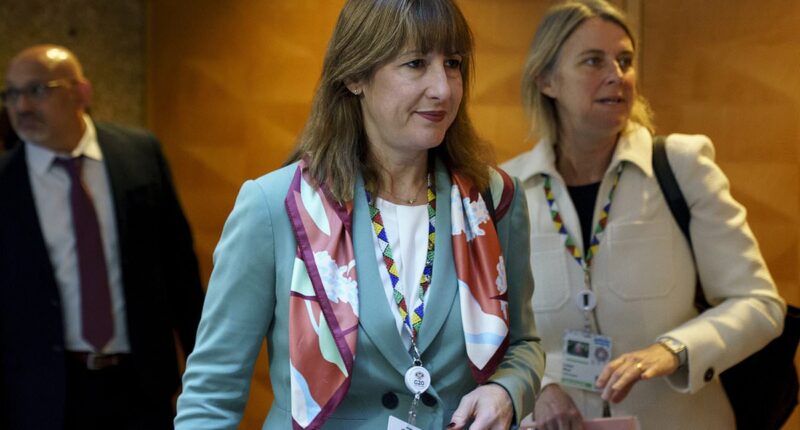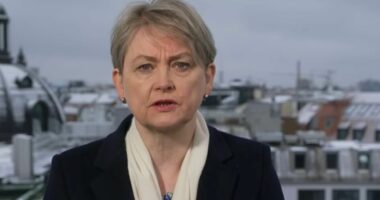Share this @internewscast.com
Rachel Reeves faced another setback today as government borrowing reached an unprecedented level for September, excluding the pandemic era. The public sector saw net borrowing rise to £20.2 billion last month, surpassing the figures from the same time last year by £1.6 billion.
Such borrowing levels in September were previously only exceeded during 2020 when the nation was heavily spending to manage the Covid-19 crisis. This latest set of troubling statistics intensifies the pressure on the Chancellor, particularly with the upcoming Budget announcement. Concerns are mounting that the government may resort to taxing the ‘wealthy’ even more to address financial shortfalls.
Meanwhile, Labour MPs are vocal in their demands for ‘wealth taxes’ as a solution to bridge budgetary gaps and support increased public spending. Although analysts had anticipated borrowing would reach £20.8 billion for September, the Treasury’s Office for Budget Responsibility (OBR) had forecasted a slightly lower figure of £20.1 billion.
The grim official figures heap pressure on the Chancellor as the Budget looms, with fears she will hammer the ‘rich’ with another wave of tax hikes.
Labour MPs have been clamouring for ‘wealth taxes’ to fill the gap in the finances and fund more spending.
Analysts had pencilled in £20.8billion of borrowing in September, but the Treasury’s OBR watchdog forecast a lower level of £20.1billion.

Rachel Reeves was hit with more bad news today as government borrowing hit a new September record outside of Covid

Analysts had pencilled in £20.8billion of borrowing in September, but the Treasury’s OBR watchdog forecast a lower level of £20.1billion

The grim official figures heap pressure on the Chancellor as the Budget looms, with fears she will hammer the ‘rich’ with another wave of tax hikes
Borrowing – the difference between public spending and tax income – was nearly £100 billion between March and September, the second-highest amount since monthly records began in 1993.
ONS chief economist Grant Fitzner said: ‘Last month saw the highest September borrowing for five years. Debt interest, the cost of providing public services and benefits all increased compared with last year, more than offsetting the rise in receipts from central government taxes and National Insurance contributions.
‘Likewise, the first six months of the financial year saw the highest overall deficit since 2020.’
Chief Secretary to the Treasury James Murray said: ‘This government will never play fast and loose with the public finances.
‘We know that when you lose control of the public purse it’s working people who pay the price.
‘That’s why we plan to bring down borrowing, and according to IMF data, are set to deliver the largest primary deficit reduction in both the G7 and G20 over the next five years.
‘We are cutting waste, improving efficiency and transforming our public services for the future – so that we can be rid of costly debt interest, instead putting that money into our NHS, schools and police.’
Nick Ridpath of the Institute for Fiscal Studies (IFS) think-tank said: ‘Today’s data shows that over the first half of the year, government borrowing has exceeded the OBR’s March forecast.
‘This is in spite of the size of the economy exceeding expectations – especially its cash size, as inflation has remained high.
‘We would ordinarily expect this to come with higher tax revenues, but this fiscal upside has not materialised, at least so far.
‘This data will be revised and revised again, and we should avoid jumping to firm conclusions based on noisy monthly data releases.
‘But if this pattern persists – and economic growth delivers less tax revenue than we’d otherwise expect – it could worsen the fiscal arithmetic facing the Chancellor at November’s Budget, and beyond’.

Debt interest has been one of the factors adding to the government’s borrowing challenge
Nigel Green of the deVere financial advisory group said the eye-watering figures ‘set the stage for a politically risky and economically damaging move against pension savings’.
‘Borrowing has surged far beyond expectations while growth remains flat and debt servicing costs are swallowing a larger share of national income,’ he said.
‘When the Treasury finds itself under this kind of pressure, pensions are often first in line. They’re seen as an easy source of revenue that can be tapped quickly, even if the long-term consequences are severe.’
He added: ‘From frozen allowances to lifetime limit changes, history shows that pensioners are the easiest targets.
‘The political calculation is that they’re less likely to shift their financial arrangements or take to the streets, but that calculation underestimates how much confidence and capital are destroyed in the process.’
















